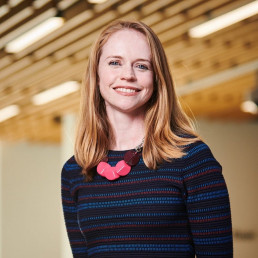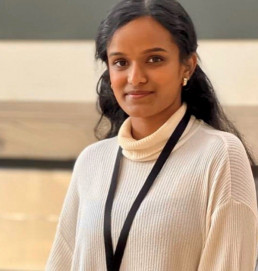Features | By Eve Lacroix
Setting students up for success
City’s focus on employability sets students up for career success as they network, gain leadership skills and think deeply about their futures.
City, University of London is the University of business, practice and the professions.
Roughly half of undergraduates at City are the first in their families to go into higher education.
Many of them are also commuter students, meaning that they live at home with their parents or caregivers and commute to campus for their classes.
For these first-generation students, studying at City is the opportunity to broaden their horizons and consider career paths that they may not have seen their close community access before.
“Employability is our mantra”
“Employability has always been part of our mantra and sits right at the heart of who we are as a university,” says Gemma Kenyon, Director of Careers and Employability.

When Gemma joined City seven years ago, she knew she wanted to formalise this commitment to employability.
A report by the Department for Education in 2017 found that the way to place students in a good position for their next steps is to support them in gaining professional experience in addition to their career-focused education.
In response to this report, Gemma and her team devised the Careers Activation Programme (CAP) which ensures that by the time they graduate, every single undergraduate will gain work experience and will have studied a career-focused module.
For students with complex lives – such as caring duties, or part-time jobs – finding the time to gain additional work experience while they study can be tough, which is why the experiences needed to be credit-bearing and non-negotiable.
“I am passionate about making sure all students have equal opportunities to develop their employability regardless of their backgrounds or other factors they are juggling in their lives,” said Gemma.
The professional experience options are varied: students might do an internship, a micro-placement or an industrial placement year.
Finding work experience posed another problem for students, especially for those from underrepresented backgrounds who may not have vast networks to call upon for help.
To facilitate these professional experiences, the University teamed up with employers ranging from global blue-chips to local SMEs, public sector bodies to charities and action groups.
Inspiring confidence in new career paths
As part of the launch of CAP, the School of Communication and Creativity (SCC) designed the ‘Working with Words’ module specifically for first-year undergraduate BA English students.
The module was co-delivered and co-designed by Holly Tonks, Lecturer in Publishing with experience working for leading publishers such as Penguin Random House and Simon & Schuster; and with Careers Consultant Lucy Ayliffe, who also has personal experience working in the arts.

One of Lucy’s goals in delivering the module was to inspire confidence in her students. She wanted them to start thinking about what they wanted to do with their careers, rather than feeling stuck with few options.
For commuter student Annie Maxted, this succeeded.
“After the module, I felt less restricted,” she said. “At the networking event, I became interested in teaching English as a foreign language and also hope to gain work experience in journalism.”


Developing leadership skills at all levels of study
At Bayes Business School, the ‘Mentoring and Coaching for Leadership’ module has offered third-year undergraduate students the chance to flex their leadership and mentoring skills.
Students are paired up with a mentee to help support them academically and socially – building their confidence and helping them attain their academic goals. The tutors are matched with either a first-year student at Bayes, or a secondary school pupil between the ages of 15 and 18 at a neighbouring school.
BSc Business Management student Avishi Agrawal was partnered with a secondary school student at the neighbouring Haggerston School.
She worried she might be too young to mentor but taking the module changed her mind.
“Mentoring has been an eye-opening experience for me,” she said. “I supported my mentee based on situations I also faced years ago, which allowed us to relate to each other.”
Segen Tesfagiorgis, Programme Manager for the module, believes that the student mentors not only develop leadership skills but also help bridge the gap between school and higher education in our local community.
Bringing theory and practice together with Accenture and Google Cloud
Mohson Khan, Head of the Corporate Relations & Employability Unit (CREU) in the School of Science and Technology (SST) was concerned with maximising students’ final months in the lead-up to the end of their studies and giving them a final boost.
He worked with Anne Lloyd, Work-based Learning Advisor to come up with a module that would best prepare third-year students to help them to step straight into careers and succeed.
The CREU team partnered with Accenture and Google Cloud to come up with the module ‘Cloud technology for business transformation’.
In the module, eight senior Accenture employees gave talks about how and why they are using cloud technology at work, about leadership and digital transformation.
Alongside these talks, students worked in teams to come up with business pitches about using cloud computing.
They gained a Google Cloud certification and had a networking session with Accenture employees, which will support them in their future job applications.
The module also provided more technical training on cloud computing delivered by City’s lecturers.
First-generation student Valli Ramaswamy took the module and is studying towards the integrated MSc Data Science.

Since 2020, Valli has also worked with the startup FirstGens, a social enterprise which helps first generation students thrive in higher education.
Its pilot programme provided eight coaching sessions for students on topics including how to access pastoral care or apply for a grant, how to secure accommodation and manage workloads.
She began as an Ambassador, quickly progressing to the role of Impact Analyst by applying the skills she had gained at City and during her industrial placement at Arm, the semiconductor company.
“Data strategy is a point of passion for me,” Valli said. “It has been incredible to be able to use a personal experience— like being a first gen student— and to think about how I can make a positive impact using my technical knowledge.”
In her third year placement at Arm, she worked with a global team to support the organisation’s People Data Analytics and Diversity, Equity and Inclusion Data Strategy.
The Accenture and Google Cloud module focused on some of the theoretical questions she encountered during her placement at Arm. At work, she processed data. In the classroom at City, she was able to get a deeper understanding of how the data systems worked.
“It was a really nice experience to integrate the theory and the practice,” she said. “The module helped fill in gaps in my knowledge and has given me a more holistic view of cloud computing in a business context.”
Levelling the playing field
CAP officially launched in September 2022, meaning each one of our new undergraduate students will be completing their studies with some work experience to their name and new knowledge and skills in their toolset.
In the year since, the programme was Highly Commended by the Institute of Student Employers Awards at their 2023 award ceremony.
Gemma was also elected to the board of AGCAS – the Association of Graduation Careers Advisory, which is an expert membership organisation for higher education student career development professionals.
In this role, she will advocate for students’ employability education based on her knowledge and implementation of CAP at City.
For Gemma, the goals of CAP run deeper than simply helping students secure a job after graduating.
“By making experience and support an integral part of the curriculum, we’re levelling the playing field,” Gemma said.